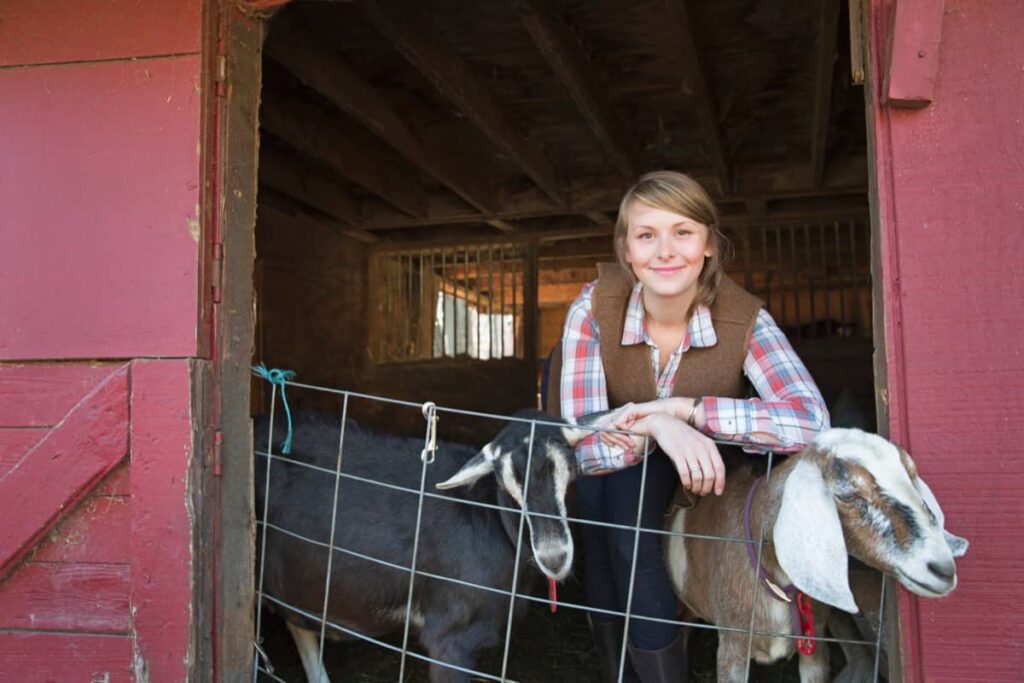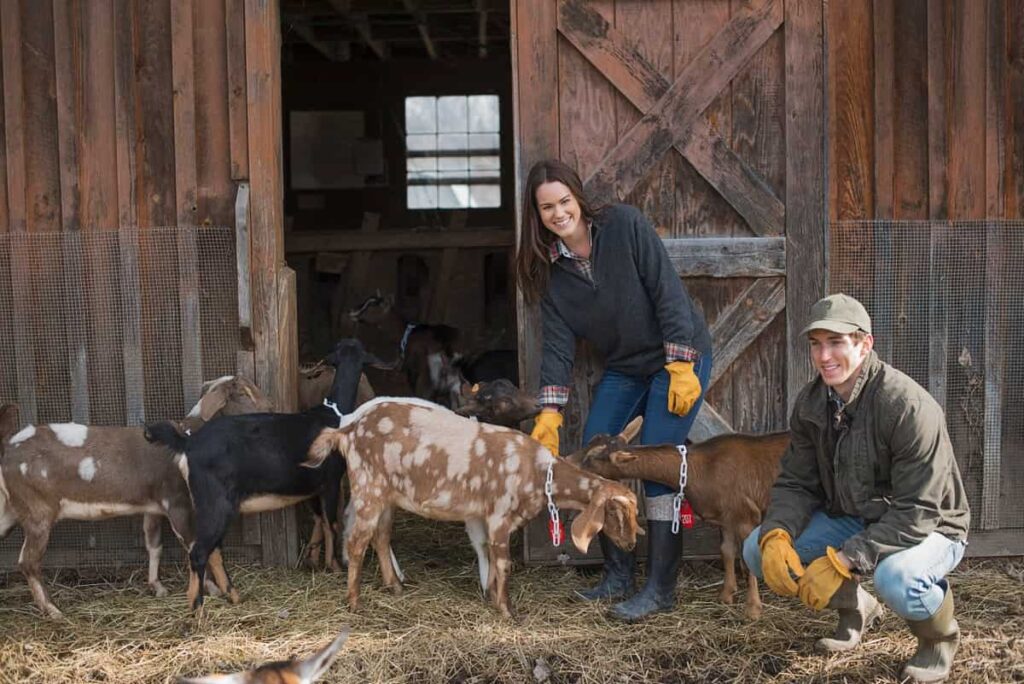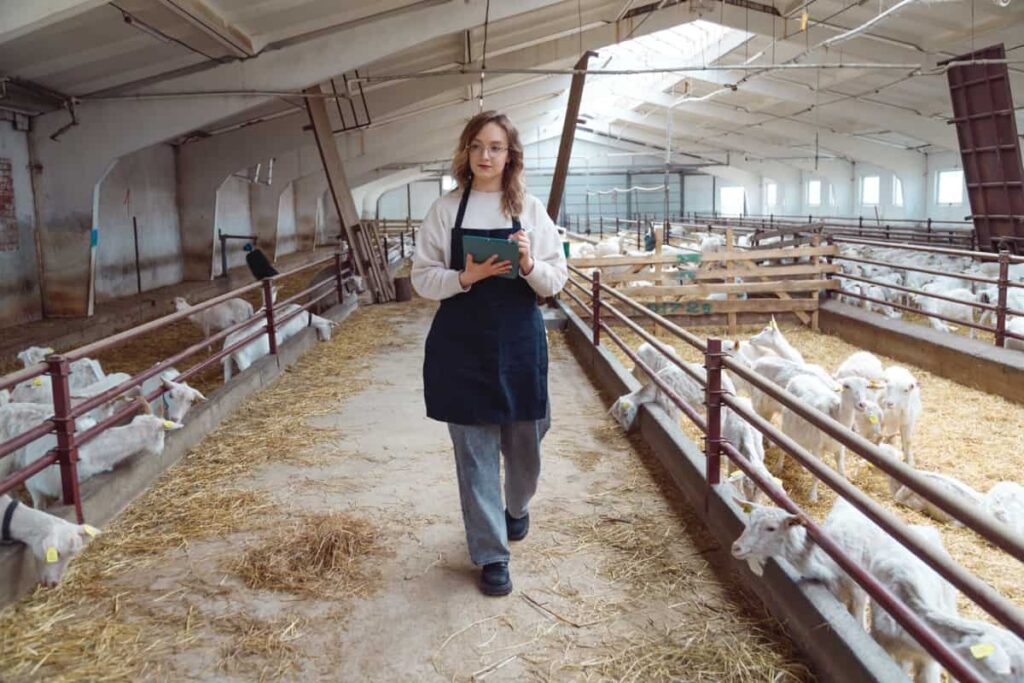Winter is a crucial season for goat farming, requiring special attention and care. Goat farming involves raising goats for various purposes, such as meat, milk, fiber, or even as pets. As a goat farmer, caring for your beloved animals requires special attention during this chilly season.

Winter Care of Goats
Winter Management Tips for Goats
- Provide adequate shelter: Goats need a dry and draft-free shelter during winter. Make sure it is well-insulated and provides protection from wind, rain, and snow.
- Offer high-quality hay: During winter, the nutritional needs of goats increase due to colder temperatures. Feed them good quality hay rich in nutrients to help them maintain their body condition.
- Ensure access to fresh water: Water is essential for proper digestion and hydration, even in cold weather.
- Practice biosecurity measures: Winter increases the risk of diseases such as pneumonia among animals kept indoors for longer periods. Implement biosecurity measures like regular vaccinations, quarantine new animals before introducing them into the herd, and maintain cleanliness within the barn.
Preparing and Caring for Your Goats in Winter
- It is essential to ensure their health and well-being during the cold months. Providing adequate shelter is crucial. Ensure enough space for all your goats to move around comfortably.
- Regularly monitor your goats’ health during this time of year as they may be more susceptible to common diseases such as respiratory infections or pneumonia due to the cold weather. Vaccinate them according to schedule and provide any necessary treatments promptly.
- Keep an eye on the temperature outside, as excessively low temperatures can harm goats’ health if not properly managed. Provide additional bedding, such as straw or wood chips, in their sleeping area for added insulation.
Winter Goat Care Guide for a Healthy Herd
- Goats need a well-balanced diet that includes roughage such as grass or hay and concentrated feed to ensure they get the energy and nutrients they need.
- Additionally, hydration is crucial for their overall health. Ensure your goats have access to plenty of fresh water at all times.
- Another important aspect of winter goat care is ensuring they’re getting enough calories. The cold weather requires more energy from your goats to maintain their body temperature.
- Providing appropriate shelter for your goats during the winter months is essential.
What to Feed Goats in Winter?
- Goats require a combination of roughage, energy, protein, vitamins, and minerals to maintain good health throughout the cold season.
- One of the best options for providing roughage is grass, alfalfa, or mixed hay. These can be excellent sources of fiber and help keep your goats warm from the inside out.
- In addition to roughage, ensuring that your goats have enough hydration is crucial. Water consumption tends to decrease during winter, but they must always have access to clean water.
- Supplementing their diet with mineral blocks specifically formulated for goats is also recommended during winter months. This ensures they receive the necessary vitamins and minerals for overall health maintenance.
Health Care and Vaccinations During the Winter
Proper nutrition is crucial in maintaining good health throughout the winter. Ensure they have enough roughage, such as hay or alfalfa, which provides energy and fiber. Supplement their diet with minerals like selenium and copper, as deficiencies can lead to various health problems.
In case you missed it: Goat Breeding and Genetics for Improved Productivity and Disease Resistance

Regular vaccinations are also important in preventing diseases that may arise during colder months. Consult your veterinarian about the necessary vaccines for your location and herd size. Common vaccinations include tetanus; clostridium perfringens types C&D, pneumonia, leptospirosis, and rabies.
Keeping Your Goats Warm in the Cold Weather
- Winter can be challenging for goats, as they are more prone to cold stress. Make sure your goat shelter is draft-free and well-insulated.
- Another crucial aspect is providing enough bedding for your goats. Regularly clean out soiled bedding to maintain cleanliness and prevent moisture build-up.
- Furthermore, consider adding heat sources such as heat lamps or heating pads in extreme weather conditions. However, exercise caution when using these devices to avoid fire hazards or accidentally burning your goats.
- In addition to proper shelter and bedding, feeding your goats appropriately is vital for maintaining their body temperature during winter. Please provide them with high-quality hay that offers ample nutrition and helps generate internal heat during digestion.
Winter Goat Shelter
- Proper shelter for your goats during the cold winter is essential to ensure their well-being and health.
- One option for a goat shelter is a traditional barn or shed, which protects from wind, snow, and rain. Ensure the structure is sturdy and secure, with adequate ventilation to prevent condensation build-up.
- Another option is a hoop house or greenhouse-style shelter. These structures allow sunlight in while providing insulation against cold temperatures. They are cost-effective and easy to set up, making them ideal for small-scale goat farming.
Best Way to Water Goats in Winter
- Water is essential for the health and well-being of goats, especially during the winter months. It’s important to provide fresh and clean water at all times.
- Another option is to use heated coils or immersion heaters placed directly into the water container. This method requires careful monitoring to ensure safety and avoid electrical hazards.
- Additionally, consider using deep buckets rather than shallow ones, as they freeze more slowly due to their larger volume of water.
How Much Grain to Feed Goats in Winter?
- Providing goats with the right grain is essential for their health and well-being. Grain is a great energy source that can help warm your goats in colder temperatures.
- The exact amount of grain to feed your goats will depend on various factors such as their age, weight, breed, and overall condition.
- Typically, adult goats may require around 1-2 pounds of grain per day during winter. However, lactating does, or those nursing kids might need more due to increased nutritional demands. Monitoring their body condition closely and adjusting the amount accordingly is crucial.
Common Goat Diseases to Look Out for in Winter
- One such disease is pneumonia, which various factors, including exposure to cold temperatures and wet conditions, can cause. Symptoms of pneumonia in goats include coughing, rapid breathing, and fever.
- Another illness that goats may be susceptible to in winter is hypothermia. This occurs when a goat’s body temperature drops too low due to prolonged exposure to cold weather. Signs of hypothermia include shivering, lethargy, and decreased appetite.
- Goats are also prone to respiratory infections during the winter months. Bacteria or viruses can cause these infections, resulting in symptoms such as nasal discharge, sneezing, and difficulty breathing.
- Parasites are another concern for goat owners year-round but become especially problematic in winter when goats spend more time indoors together.
- To prevent these diseases from affecting your herd during winter, it’s important to provide proper shelter with adequate ventilation and keep your goats dry. Remember that each goat is unique, so consult a professional if you notice any signs of illness or have concerns about your animal’s well-being during winter.
In case you missed it: Pregnant Goat Care: A Comprehensive Information Guide

Conclusion
Goats are hardy animals, but they need special care during the winter. Proper nutrition is essential for keeping your goats healthy and thriving in cold weather. Please make sure they have access to high-quality hay or forage, as well as any necessary supplements.
- Types of Grass Growing for Goat Farm
- How to Train Goats for Milking: A Beginners Guide
- Goat Milking Practices and Equipment: A Beginner’s Guide
- Goat Farming for Fiber: Producing Mohair and Cashmere
- Maximizing Goat Milk Production: Tips for Dairy Goat Farmers
- Goat Farming as a Family Business: Strategies for Success
- Profitable Kenya Goat Breeds for Commercial Dairy and Meat Business
- Unlock the Secrets of Oberhasli Goat: Discover Raising and Management Practices
- Ultimate Guide to Myotonic Goats: Explore Profile to Raising